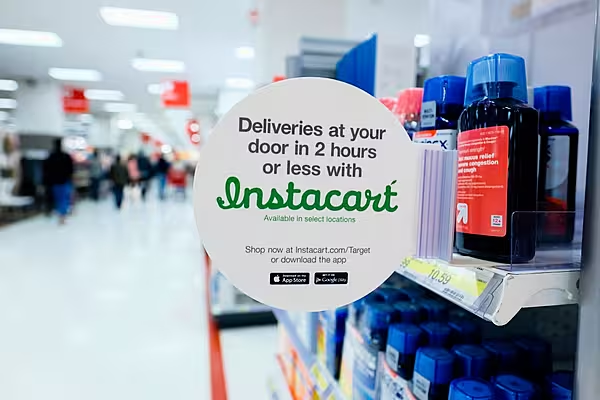For years, Instacart Inc. pitched its online grocery delivery service to stores as a way to fight against the threat of Amazon.com Inc., the world’s biggest online retailer. Whole Foods Market Inc., Costco Wholesale Corp. and CVS Health Corp. were among those that signed on, hoping to band together against the e-commerce behemoth.
The arrangement became much more complicated Friday, when Amazon said it was buying Whole Foods for $13.7 billion. For Instacart, the deal will turn Whole Foods -- its premier partner and investor -- into a subsidiary of its biggest foe.
Instacart has about four years left in a delivery partnership it signed with Whole Foods in 2016, said a person familiar with the matter. The contract made Instacart the exclusive delivery provider for Whole Foods perishables, including produce, deli meats and baked goods, as well as nearly all non-perishable items, the person said. Instacart believes Amazon’s purchase won’t affect the arrangement, said the person, who asked not to be identified because the details are private.
Delivery Business
Silicon Valley has made a huge bet on Instacart, despite the dramatic implosion of another grocery-delivery business called Webvan after the dot-com bubble. Instacart was founded in 2012 by Apoorva Mehta, who’s still chief executive officer today. His company has attracted some $700 million in the four years since it started. Sequoia Capital, a major investor in both Webvan and Instacart, doubled down on the younger startup by leading a $400 million funding round a few months ago. Sequoia and Whole Foods declined to comment.
“From the beginning, we’ve been committed to helping grocers compete online,” Instacart wrote in an emailed statement. “That’s more important than ever given Amazon just declared war on every supermarket and corner store in America.”
Since Whole Foods became Instacart’s first national partner in 2014, the two companies have had a tight relationship: Some Whole Foods stores have cashiers dedicated to Instacart orders, as well as special in-store shoppers and staging areas for bagging online orders. They deepened the relationship in 2016 with the long-term contract. Bloomberg reported last year that the retailer also invested more than $30 million in the startup. Whole Foods wasn’t granted access to Instacart’s private financial disclosures as part of the investment, nor will Amazon receive such information, said the person familiar with the matter.
Instacart generates revenue from commissions on orders from 160 retail partners, delivery fees from customers, advertising on its site and coupons. Whole Foods accounts for less than 10 percent of Instacart’s revenue, said the person, without clarifying whether that includes delivery fees or other sales generated from those transactions. This year’s investment led by Sequoia valued the San Francisco startup at $3.4 billion.
Amazon Fresh
Amazon sells fresh produce and household items in more than 20 U.S. cities and abroad. Instacart operates in 69 U.S. markets. If Amazon chooses to continue relying on Instacart for delivery at some stores, the startup could prove itself to be a valuable partner, said Guru Hariharan, a former Amazon manager and founder of Boomerang Commerce Inc., a company that designs software for large retailers.
“Instacart’s core value proposition is last-mile delivery at scale, something Amazon has always struggled with,” Hariharan said. “The key for Instacart is to morph itself into a service that is additive, not competitive for the big giant, Amazon.”
If the relationship falls apart, Instacart may be able to bolster its original pitch about the perils of Amazon to lure other retail partners. Most grocers don’t have the resources to build their own online delivery systems, said Brian Frank, who invests in food-tech companies through his FTW Ventures fund.
“While Instacart could lose their crown jewel of Whole Foods, they may gain in a swell of demand from the rest of the market, and even more mid-range and budget stores coming to them for services to try and compete with Amazon,” Frank said.
News by Bloomberg, edited by ESM. Click subscribe to sign up to ESM: The European Supermarket Magazine.














